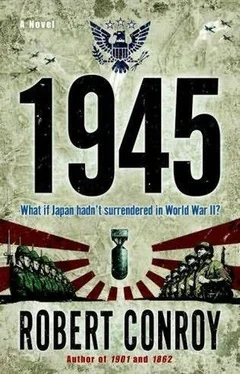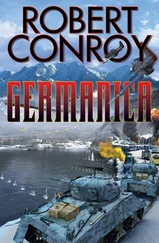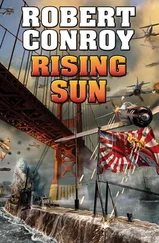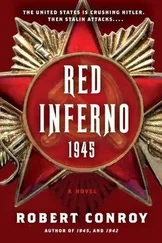Robert Conroy - 1945
Здесь есть возможность читать онлайн «Robert Conroy - 1945» весь текст электронной книги совершенно бесплатно (целиком полную версию без сокращений). В некоторых случаях можно слушать аудио, скачать через торрент в формате fb2 и присутствует краткое содержание. Жанр: Альтернативная история, на английском языке. Описание произведения, (предисловие) а так же отзывы посетителей доступны на портале библиотеки ЛибКат.
- Название:1945
- Автор:
- Жанр:
- Год:неизвестен
- ISBN:нет данных
- Рейтинг книги:3 / 5. Голосов: 1
-
Избранное:Добавить в избранное
- Отзывы:
-
Ваша оценка:
- 60
- 1
- 2
- 3
- 4
- 5
1945: краткое содержание, описание и аннотация
Предлагаем к чтению аннотацию, описание, краткое содержание или предисловие (зависит от того, что написал сам автор книги «1945»). Если вы не нашли необходимую информацию о книге — напишите в комментариях, мы постараемся отыскать её.
1945 — читать онлайн бесплатно полную книгу (весь текст) целиком
Ниже представлен текст книги, разбитый по страницам. Система сохранения места последней прочитанной страницы, позволяет с удобством читать онлайн бесплатно книгу «1945», без необходимости каждый раз заново искать на чём Вы остановились. Поставьте закладку, и сможете в любой момент перейти на страницу, на которой закончили чтение.
Интервал:
Закладка:
"Sonofabitch, that was close!" snapped Collins.
"Get to your men," Morrell ordered. Collins was in charge of a score of men Paul had designated their reserve. They were to reinforce any area where the Japs broke through.
Otherwise, the defense of Round Top consisted of two platoons that faced the front and curved along the sides of the hill. There they met the third platoon, which faced rearward and had the greatest length of ground to cover. Putting most of his defenders toward the front had seemed like the best idea, but now with the Japs hugging the hill and circling behind it, Paul was no longer so certain.
A group of men ran through the rear of the defenses, and Morrell recognized some of them from Ruger's headquarters and heavy-weapons companies. Then he remembered that theirs was the hill behind Round Top, the one the kamikaze had hit.
"Where's the major?" he asked, and was told that no one knew. A Jap plane had landed smack on the command bunker, then the hill had been overrun. The Japs were solidly behind Round Top. At least a couple of dozen men had made it through to him and were welcome reinforcements. Poor Ruger, he thought, then quashed it. If the major was dead, Paul would mourn for him some other time.
"Another plane!" came the cry. This time it was even lower than the last.
"Get down!" Paul yelled as it appeared through the mist. This one was not going to miss Round Top. The explosion of the crash was deafening, and the shock wave passed over him like a hot, sharp wind. Gasoline flamed into a smoky pyre right where his front-facing second platoon met the rear-facing third. Men were down and the trench was destroyed. Now he understood why the Japs hadn't launched their attack. They had been waiting for the kamikazes to soften up the hilltop fort. In the absence of artillery, the Japs were using suicide pilots.
They had succeeded in breaching his defenses. Fully a third of his defensive positions were destroyed, and the main Jap attack hadn't even begun.
CHAPTER 81
KADENA, OKINAWA
Lt. Gen. Matthew Ridgway didn't like dealing with the press. While some of the reporters were pretty good joes, others were nothing but sharks who'd sell their mothers for a story. That is, he smiled inwardly, if they'd had mothers. There were exceptions among Ridgway's compatriots, of course. Patton, for instance, had swaggered and postured for the press, while the late MacArthur always seemed to be onstage and never at a loss for a quote.
The press was, however, safely muzzled in this war and, with few exceptions, understood the need for it and cooperated with the wartime censorship regulations. After all, who wanted to give out military secrets that would cause the deaths of American boys? For that reason, and because the journalists in Bradley's press pool were men of integrity, Ridgway felt fairly comfortable with the men gathered in his office. Long after the war they could write all the books they wanted and analyze to their hearts' content all the decisions others made. In the meantime, every word they wrote was subject to review and removal.
It was a fairly eclectic and highly qualified pool of talent. Wilfred Burchett represented the London Daily Express, Theodore White was employed by Time-Life, Hanson Baldwin was from The New York Times, and Webley Edwards was a radio correspondent from CBS.
"Gentlemen," Ridgway began, gesturing toward a large map of Kyushu that hung on the wall behind him, "let me give you a quick overview. The Japs have launched major attacks against our positions, primarily along our right flank. This is the area covered by the I Corps, which consists of the 25th, 41st, and 53rd Infantry Divisions. At this time there are no serious attacks against either the marines on our left flank or XI Corps in the middle. It appears that the Japs have concentrated their thrusts against I Corps only, and we first thought their goal was a penetration down to Ariake Bay."
"Can they make it?" Burchett asked.
"Not a chance. They are about seventy miles from the bay and we'll stop them well before they get anywhere near it. We are in the process of moving two divisions from IX Corps, the 81st and 98th infantry, into blocking positions behind I Corps. IX Corps had rotated back into reserve and is close enough to help out. No, gentlemen, their goal is not Ariake Bay. The Japanese are just squandering lives."
"Ours included, I presume," Baldwin commented.
Ridgway winced. "Absolutely."
White raised his hand. "I know it's certainly simpler on a map than it is in reality, but can any of the other units, such as the marines, attack north and swing behind the Japs?"
Ridgway stifled a sigh. Spare me from armchair generals. "Not in enough time to help out. While the Japs have stripped many of their defenses to form for this attack, the soldiers left behind are well dug in and in strongly situated positions. They would hold out for some time, and even if overrun, the mountainous lay of the land would preclude any quick move around the Japanese rear. No, the battle will be fought with the forces currently in place and those I mentioned as moving up to reinforce them."
"And the weather was the primary reason they got the jump on us?" This was from Edwards, and it was evident from his voice that he was used to being behind a microphone as well as a typewriter.
"Yes, although we knew it was likely coming, there was little we could do to prevent them from moving and massing their forces under the cover of cloud and rain. We dug in as much as possible and we can only hope it was enough."
"Sort of like the Ardennes all over again, eh, General?" This from the Brit, Burchett.
"Except that we are much better prepared. It shows that possessing overwhelming power is not always enough to prevent a desperate enemy from trying one last throw of the dice. The Japs will doubtless achieve local penetrations and overrun some positions, but they will be stopped." Ridgway faced Baldwin. "Like you said, we will suffer many, many needless casualties. Except for the fighting in I Corps area, the war is over."
"Any comment on the kamikazes?" asked White.
Ridgway's expression turned even grimmer than before. "That the Japs would use kamikazes on frontline positions came as a complete shock. With our warships pulled back, we expected suicide attacks on fuel depots, storage dumps, and command centers, but not on frontline trenches and pillboxes. Gentlemen, they hurt us badly with that tactic. Our antiaircraft guns were almost all situated farther rear. Just like the picket destroyers caught hell off Okinawa, our boys in the foxholes and trenches are taking a beating, and there isn't a helluva lot we can do about it."
"But why doesn't the weather hamper them like it does us?" Baldwin queried. He had seen Iwo Jima and was familiar with hell.
"Because they don't care. Jap planes by the hundreds, maybe a couple of thousand, are skimming a few feet over the hills, and when they see something that looks like our lines, they line up and crash into it. Since they intend to die in the first place, they are willing to take risks that we wouldn't even consider. If they lose some of their pilots through accidental crashes into the wrong hillsides, they just don't seem to give a damn."
It was White's turn. "What about Hirohito? Where is he and what's he up to?"
"Hirohito is now in Kagoshima City trying to coordinate an end to the hostilities. He has recorded messages for the Japanese troops and people that are being broadcast as we speak. Additionally, hundreds of thousands of leaflets are being dropped on the combatants. Hopefully, it'll work.
"The remnants of Japan's armies in the Philippines under General Yamashita have given up as a result of Hirohito's actions, and the garrisons of Rabaul and Hong Kong have also surrendered. Even in Kyushu, General Yokoyama is trying to recall his troops. It's working. It'll take time, but it's working." Then Ridgway sagged. "I can only hope that it isn't too late for our boys in I Corps."
Читать дальшеИнтервал:
Закладка:
Похожие книги на «1945»
Представляем Вашему вниманию похожие книги на «1945» списком для выбора. Мы отобрали схожую по названию и смыслу литературу в надежде предоставить читателям больше вариантов отыскать новые, интересные, ещё непрочитанные произведения.
Обсуждение, отзывы о книге «1945» и просто собственные мнения читателей. Оставьте ваши комментарии, напишите, что Вы думаете о произведении, его смысле или главных героях. Укажите что конкретно понравилось, а что нет, и почему Вы так считаете.












